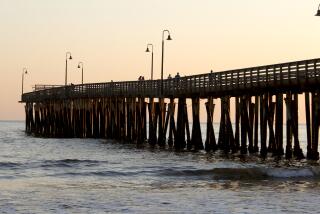THE NATION - News from Feb. 1, 2009
- Share via
ATLANTIC BEACH, S.C. — Every day she can, Jannie Isom walks a couple hundred yards from her home for some of the best Atlantic views along the 60 miles of beach that make up South Carolina’s Grand Strand.
Not a single building obstructs the shore as she strolls the three blocks of Ocean Boulevard that parallel the water. Behind her are weathered one-story houses and vacant lots. One house has iron burglar bars on the windows facing the ocean.
Atlantic Beach looks frozen in time. On a quiet, chilly gray day, Isom can almost hear the soulful sounds of Marvin Gaye, the Drifters and Otis Redding roll over the dunes and picture summer lovers gliding across beachfront patios as they did 50 years ago, when segregation was the law and the place, nicknamed the Black Pearl, became a leading ocean resort for blacks up and down the East Coast.
The tiny town doesn’t look much different than it did in its heyday, just more run-down. That sets it apart from most of the Grand Strand, where towering beachfront hotels nestle against neon restaurants and brightly lit attractions.
Roads and property lines drawn up under segregation have left Atlantic Beach physically isolated from its oceanfront neighbors. It connects to U.S. Highway 17, the main drag along the Grand Strand. All other roads are blocked on both ends and fences mark the town line on both sides from the beach to the highway, effectively making the town a cul-de-sac facing the ocean and surrounded by North Myrtle Beach, which has almost 40 times the population.
In its isolation, Atlantic Beach is dying. Taxes are high, and the town contracts out all major services except its police force. Its single biggest taxpayer, the Crazy Horse strip club, paid its 2009 levy early to keep the town from laying off its handful of employees as it struggles under hundreds of thousands of dollars in unpaid court judgments. The six-seat zoning board has one member.
“I think there’s a future here. I’ve thought that for a number of years,” said Isom, 65, who moved here decades ago to run a novelty shop with her husband and to raise four kids, all of whom have moved away. “We just need to get the right people in place to make it work.”
Many of the 390 residents say they want to save the town from fading away entirely or getting swallowed in a merger with the surrounding city. Atlantic Beach sits decaying, however, while old-timers and newcomers quarrel over key decisions, including how to pay off the town’s debt and whom to hire as city manager.
For Isom and others, the fight over this relic of segregation -- still more than 80% African American -- is a question of history and black achievement. Just ask John Sketers, 73, whose parents opened a restaurant in Atlantic Beach when he was a teenager in 1952. He came back 40 years ago, serving as a town councilman for about half that time. “I want to prove to people in general that we are capable of maintaining and operating a city just as well as anyone else,” Sketers said.
On the other side are people like Donnell Thompson, voted into council a year ago. The 50-year-old black businessman fell for Atlantic Beach, moving here two years ago because he thought he could put his money, earned by leasing buildings to healthcare firms, back into an area to help it thrive again.
The old guard’s way of thinking is keeping that from happening, he said.
“Atlantic Beach as you once knew it will never be the same. Clearly a lot of land has changed hands. That alone has changed the landscape,” Thompson said. “I think it can be a great place to live on the Grand Strand. There’s a lot of culture, there’s a lot of history there. But that’s then and this is now.”
Thompson, other newer arrivals and people who have fallen out of favor with those who helped charter Atlantic Beach in 1966 often clash with pioneers like Sketers. Atlantic Beach’s four-person town council is so evenly split that it frequently stalls over 2-2 votes. The last mayoral election in 2007 was decided by one vote, and the result was mired in legal challenges for more than a year until a recent revote that elevated a councilwoman to mayor.
Retha Pierce, sworn in Jan. 20, urged the council to put aside past differences and renounce policies that she said “sell off our property, incur more debt and put our charter at risk.”
“We’re here today because God has a purpose and a plan for Atlantic Beach. No power on the Earth can stop this town’s rise from despair,” she said.
What became Atlantic Beach started out in the 1930s as two tracts of oceanfront land bought by a black man named George Tyson, who invited other blacks working in Myrtle Beach to spend their days off at one of the few beaches in the Southeast not reserved for whites under Jim Crow laws.
Tyson eventually couldn’t afford the land, and sold it a decade later to a group of blacks in North and South Carolina who split the property into lots for hotels, nightclubs and summer homes. After World War II, many black doctors, lawyers and other professionals flocked to the beach. They were joined by former soldiers -- who had lived years earlier in temporary housing -- as they built an Air Force base.
There were bumper cars, a merry-go-round, a Ferris wheel and jukeboxes. Restaurants and stores lined the streets. “This was the destination for black people,” Sketers said.
When Jim Crow started dying in the 1960s, vacationers could stay at the bigger, more modern hotels and play at the amusement parks long closed to blacks. The luster of the Black Pearl began to fade.
“Once it became integrated, Atlantic Beach began to not go forward any more,” Sketers said.
Absentee landowners let their properties crumble, corruption moved in. A former town councilman is spending life in federal prison for running a 20-year conspiracy to sell marijuana and cocaine in the town.
There’s been talk for several years of state lawmakers passing a bill to let the secretary of state dissolve the town charter.
That couldn’t come soon enough for Amy Breunig. She owns about a dozen lots in the town, including the Atlantic Inn. Almost three years ago, a columnist in the local newspaper did a glowing profile about her fighting for Atlantic Beach’s future by purchasing and restoring rundown hotels and other structures. She’s still building. But she’s ready for the town to die.
“It no longer has the ingredients to be a town. No police chief, barely any police officers, no trash service, no water service, no fire service. What does it have that makes it a town?” asked Breunig, 30, who is white and lives a short distance away in North Myrtle Beach.
“The past has been used as a crutch to keep this going. . . . It’s time for this town to go.”
Developers keep talking about grand plans for hotels and shops on those vacant lots so close to the ocean that the air smells salty. It’s easy to lose count of the number of development announcements from the last 20 years.
Most recently, Marathon Development Group Inc. of Norfolk, Va., promised to review its plans for condominiums on top of ground level shops as soon as the economy improved.
Such structures might have gone up a long time ago, as the Grand Strand boomed, if it weren’t for the crime and drugs, some say. Others think town leaders took too long to remove a ban on buildings taller than three stories. A few believe leaders wanted more concessions from builders and ran them off.
“Right now, I can say the future looks kind of grim unless we get some money in here. That’s the bottom line. Debt keeps coming due, and we don’t have anything that’s going to generate any fast cash,” Sketers said.
Some consensus is forming on how to bring in business once the economy improves. Leaders are considering knocking down the fences and connecting Ocean Boulevard. There is some talk about disbanding the police force and paying North Myrtle Beach officers to patrol until more money starts rolling in.
Thompson said there needed to be some agreement or things are doomed.
“If we are sitting around here another six months or so doing the same thing we’ve currently done for the last year, then I am not necessarily -- ,” Thompson said, pausing, then changing gears before he says something that will get people angry with him. “I don’t know one way or the other. It just begins to be frustrating.”
More to Read
Sign up for The Wild
We’ll help you find the best places to hike, bike and run, as well as the perfect silent spots for meditation and yoga.
You may occasionally receive promotional content from the Los Angeles Times.






